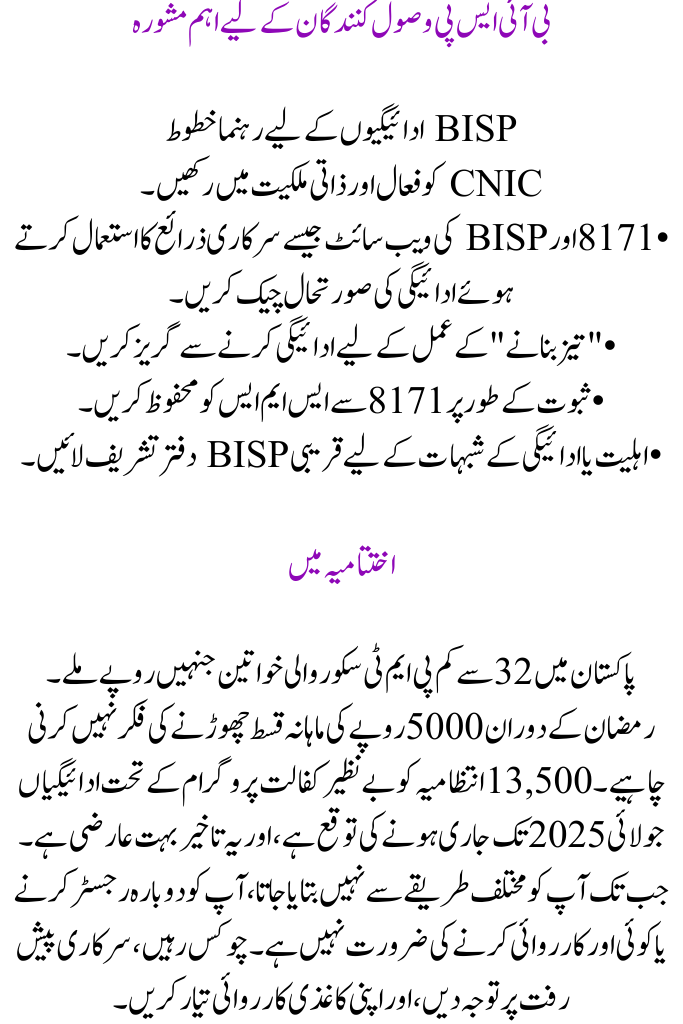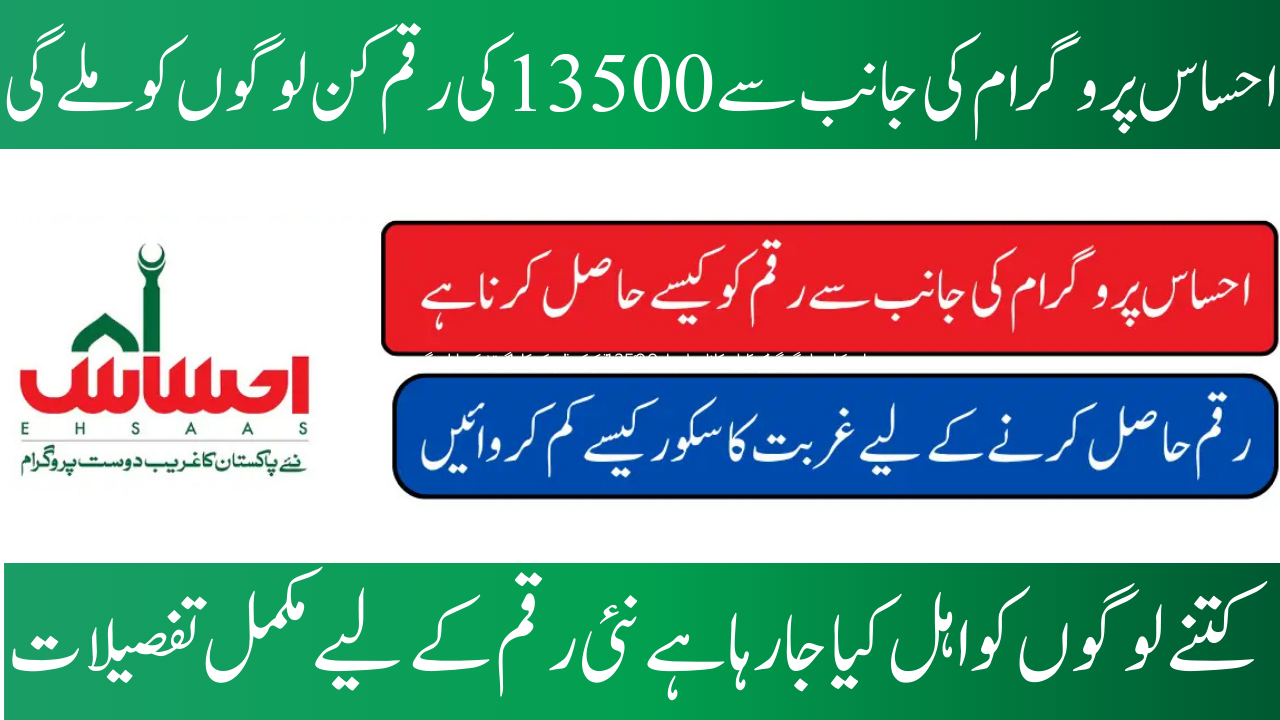Payment for Ehsaas Program 2025 BISP
Many women worry that because they don’t know their poverty score, they won’t receive their usual quarterly disbursement of Rs. 13,500 from the Ehsaas Kafalat program. Remember that it hasn’t been canceled since women with a PMT score below 32 are still eligible and should get the compensation by July 2025. This page goes into great depth on the conditions, qualifying requirements, payment schedule, and what to do if any payments are delayed. This year’s Ehsaas payments are meant to help women comprehend them, no matter where they reside.
You can read more: Second Payment of the BISP Kafalat Program in May 2025 Latest Update on The payment Details
What is the PMT Score and How Does It Affect BISP?
BISP and the Ehsaas program employ the PMT Score Poverty Means Test to assess a family’s eligibility for financial aid. It is computed using variables such as household conditions, education, dependents, and income. The household is deemed financially insecure and is qualified for quarterly payments under the Benazir Kafalat Program if the score is less than 32. The family could not be eligible or included in the current payment cycle if it is more than 32. The PMT method makes sure that the most worthy households receive the fewest government cash.
In 2025, who is still eligible for Rs. 13,500?
A payment of Rs. 13,500 is available to women who received Rs. 5000 during Ramadan as part of a special package, have a PMT score below 32, have not had their information deleted or barred from the BISP database, have not received any disqualification SMS or messages, and have valid household and CNIC details. It is anticipated that the payment will be made in July 2025, the following cycle.
Why Do Some Women Experience Payment Delays?
Updates to payment processing, cross-verification of beneficiary data, and system checks to avoid fraud or duplication are the technical reasons for the delay in paying the Rs. 13,500 installment after Ramadan, not new regulations or disqualifications. Some ladies experienced a brief halt as a result of the system flagging records for verification prior to the next payment being issued. Payments are anticipated to begin in July 2025 when the government reviews these documents.
Timeline for Anticipated Payment of Rs. 13,500
With an emphasis on providing a quarterly payment of Rs. 13,500 to qualifying women who participated in the Ramadan Rs. 5000 relief, have a valid PMT score of less than 32, and have not been disqualified in any recent review, the government is getting ready for the second phase of Benazir Kafalat payments for 2025. Women with PMT < 32 and recent recipients are included in the target group.
You can read more: Initiative for Maryam Nawaz Rashan Cards for PSER-Registered Families 2025
How to Verify Your Ehsaas or BISP Eligibility
BISP Eligibility Check Methods
• Send CNIC to 8171 via SMS for eligibility status.
• Visit the BISP Tehsil Office with the original CNIC for PMT score and payment record check.
• Call the BISP helpline for assistance or record check issues.
• Always use official government sources for status checks; avoid relying on unverified private agents or social media messages.
| Topic | Details |
|---|---|
| Eligibility | Women with PMT scores below 32 received Rs. 5000 during Ramadan, with no disqualification or data issues. |
| Payment Amount | Rs. 13,500 quarterly under the Benazir Kafalat Program. |
| Expected Payment Date | July 2025 (next cycle). |
| PMT Score | Stands for Poverty Means Test; lower score = higher poverty. |
| Eligibility Check | SMS CNIC to 8171, visit the BISP office, or check the online portal. |
| Delay Reasons | System updates, data verification, not due to disqualification. |
| What to Do If Unpaid | Visit the BISP office with your CNIC, written complaint, and proof of eligibility. |
| Important Tips | Keep your CNIC active, use only official sources, don’t pay agents, and save 8171 SMS. |
What Should You Do If You Don’t Get Paid in July?
Check to see whether your PMT score is less than 32 and submit a formal complaint to your local BISP office if you haven’t received your installment for July. Bring a written application, your CNIC, and proof of payment. Ask the office to verify your eligibility once again. Make sure your information is correct and current because delays might be caused by inactive CNICs, mismatched records, or updates from the NSER survey.
You can read more: For Registered Women, BISP 8171 Payment Verification May 2025
Crucial Advice for BISP Women Recipients
Guidelines for BISP Payments
• Keep CNIC active and in personal possession.
• Check payment status using official sources like 8171 and BISP’s website.
• Avoid paying for the “speeding up” process.
• Save the SMS from 8171 as proof.
• Visit the nearest BISP office for eligibility or payment doubts.
In Conclusion
Women in Pakistan who received Rs. 5000 during Ramadan and had a PMT score below 32 shouldn’t worry about missing their Rs. 13,500 monthly payment. The delay is just temporary, since the administration plans to provide payments under the Benazir Kafalat Program by July 2025. You don’t need to re-register or take any other action until instructed to do so.

FAQs
1. If I got Rs. 5000 during Ramadan, would I still receive the Rs. 13,500 payment?
Yes, you are qualified if your PMT score is less than 32 and you haven’t received a disqualification message. It is anticipated that the Rs. 13,500 installment will be made available in July 2025.
2. How can I find out if I qualify for the BISP/Ehsaas payment?
The following methods will allow you to verify your status:
- Send an SMS with your CNIC to 8171.
- Bring your CNIC to the BISP Tehsil Office.
- Visit 8171.bisp.gov.pk to check online.
- If you need support, contact the BISP desk.
3. What should I do in July 2025 if I don’t get the money?
Visit the BISP office that is closest to you with:
- Your initial CNIC
- An application in writing
- Any evidence of past SMS or payment
Ask to have your eligibility checked again. Data inconsistencies or inactive CNICs, not disqualification, are frequently the cause of delays.
